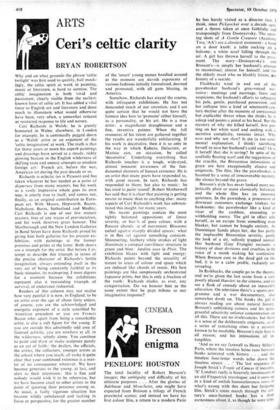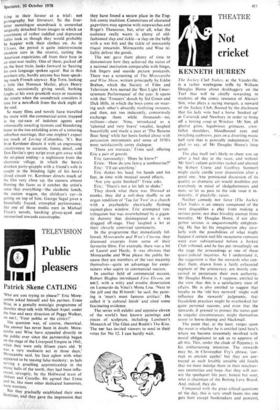CINEMA
Bresson enigma
PENELOPE HOUSTON
The total lucidity of Robert Bresson's images; the ambiguity and difficulty of his ultimate purposes . . . After the glories of Balthasar and Mouchette, one might have expected from Bresson a trilogy of French provincial scenes; and instead we have his first colour film, a return to a modern Paris he has barely visited as a director (not, think, since Pickpocket over a decade ago), and a theme taken at once faithfully and transposingly from Dostoyevsky. The open-
ing shots of A Gentle Creature (Academy Two, `AA') are a classical statement : a hand
on a door knob; a table rocking on a balcony; a white scarf falling through the air. A girl has thrown herself to the pave- ment. The story—Dostoyevsky's and Bresson's—is simply her husband's attempt to reconstruct, almost for himself, and for the elderly maid who so blankly listens, the history of a suicide.
Flashbacks wind in and out of the pawnbroker husband's grey-voiced nar- rative: meetings and marriage, fears and suspicions, the husband's efforts to subjugate his pale, gentle, purchased possession, and her collapse into a kind of nineteenth-cen- tury decline after the moment of unreasoned but explicable threat when she thinks he is asleep and points a pistol at his head. But the mystery of why she killed herself, first put- ting on her white scarf and smiling with a secretive complicity, remains intact. Why now and why not then? Js she (a too senti- mental explanation, I think) sacrificing herself to save her husband's cold soul? Or is it herself that she is saving? In spite of the soulfully floating scarf and the suggestions of the crucifix, the Bressonian intimations of grace are here exceptionally elusive and enigmatic. The film, like the pawnbroker, is haunted by a sense of irrecoverable mystery, the silence beyond the grave.
Bresson's style has never looked more ma- jestically plain or more classically balanced. and the whole film has an immense quietness. In the pawnshop, a procession of downcast customers exchange trinkets for banknotes: the pawnbroker like a kind of vicar of the cashbox, extending or withholding mercy. The girl in effect sells herself,-as an escape from something even bleaker, but cannot be bought entirely. As Dominique Sanda plays her, she has partly the implacable Bressonian severity, partly the look of a sly, sullenly trapped animal. Her husband (Guy Frangin) recounts a history of dour divisions and cruelties in the voice of a monk making his confession. When Bresson cuts to the dead girl on the bed, it is to a calm profile, radiantly un- revealing.
In flashbacks, the couple go to the theatre, and we're given the last scene from a very poorly played Handel; to the cinema, and we see a flash of comedy about an innocent's education. On television there's a sports pro- gramme and a war documentary, also somewhat dwelt on. The books the girl is always reading are about natural history. Bresson's unblinking camera and his spare. graceful selectivity enforce concentration on all this. There are no irrelevancies; but there is a sense of the deliberately enigmatic, as of a series of tantalising clues to a mystery known to be insoluble. Bresson's style here is all reason; and his intimations all in- tangibles.
'And so we say farewell to Henry Miller's Paris, where the timeless Seine runs between banks saturated with history . . . and the timeless four-letter words echo down the timeless streets . . .' The last sequence of Joseph Strick's Tropic of Cancer (Cinecenta. 'X' London) really is bizarrely reminiscent of an old Fitzpatrick travelogue; and it sums up in a kind of owlish humourlessness some of what's wrong with this short but fatiguing film. Strick's route march through the cen- tury's once-banned books has a dour earnestness about it, as though he were testi- fog in their favour at a trial: not pornography but literature. So the four- letter monologue soundtrack is somewhat surgically detached from images in which an assortment of rather raddled and depressed ladies look as though they would probably be happier with their clothes on. As in Ulysses, the period is quite indeterminate (modern cars in the streets), cutting the American expatriates off from their base in an inter-war reality. One of them, packed off on the boat train, looks forward to 'hearing his own language spoken again'. But in this nowhere city, hardly anyone has been speak- ing much French anyway. Rip Torn, -looking a little like Norman Mailer, plays Henry Miller, occasionally giving small, barking laughs at his own prankish ways or roaming the streets when the soundtrack considers it time for a newsflash from the dark night of the soul.
So many films and novels have travelled the route with the commercial artist, trapped in the rat-race of indolent agents and whimsically exactiag tycoons and blundering home to the too-enfolding arms of a tottering suburban marriage, that one mightn't expect too much of Loving (Columbia, 'X'). But Irvin Kershner directs it with an engrossing attentiveness to accurate, funny_detail, and Don Devlin's spry script even gets away with the set-piece ending—a nightmare from the electronic village, in which the hero's drunken party-grapple with a friend's wife is caught in the blinding light of his host's closed circuit Tv. Kershner directs much of the film very close up, the camera almost blurring the faces as it catches the artist's sense that everything—the alcoholic lunch, the station wagon, the children's cat—is getting on top of him. George Segal gives a beautifully frayed, crumpled performance; like one of those media men in Michael Frayn's novels, lurching glassy-eyed and mesmerised towards catastrophe.







































 Previous page
Previous page